Review: Three Decades Later, M. BUTTERFLY Still Beguiles, Shocks
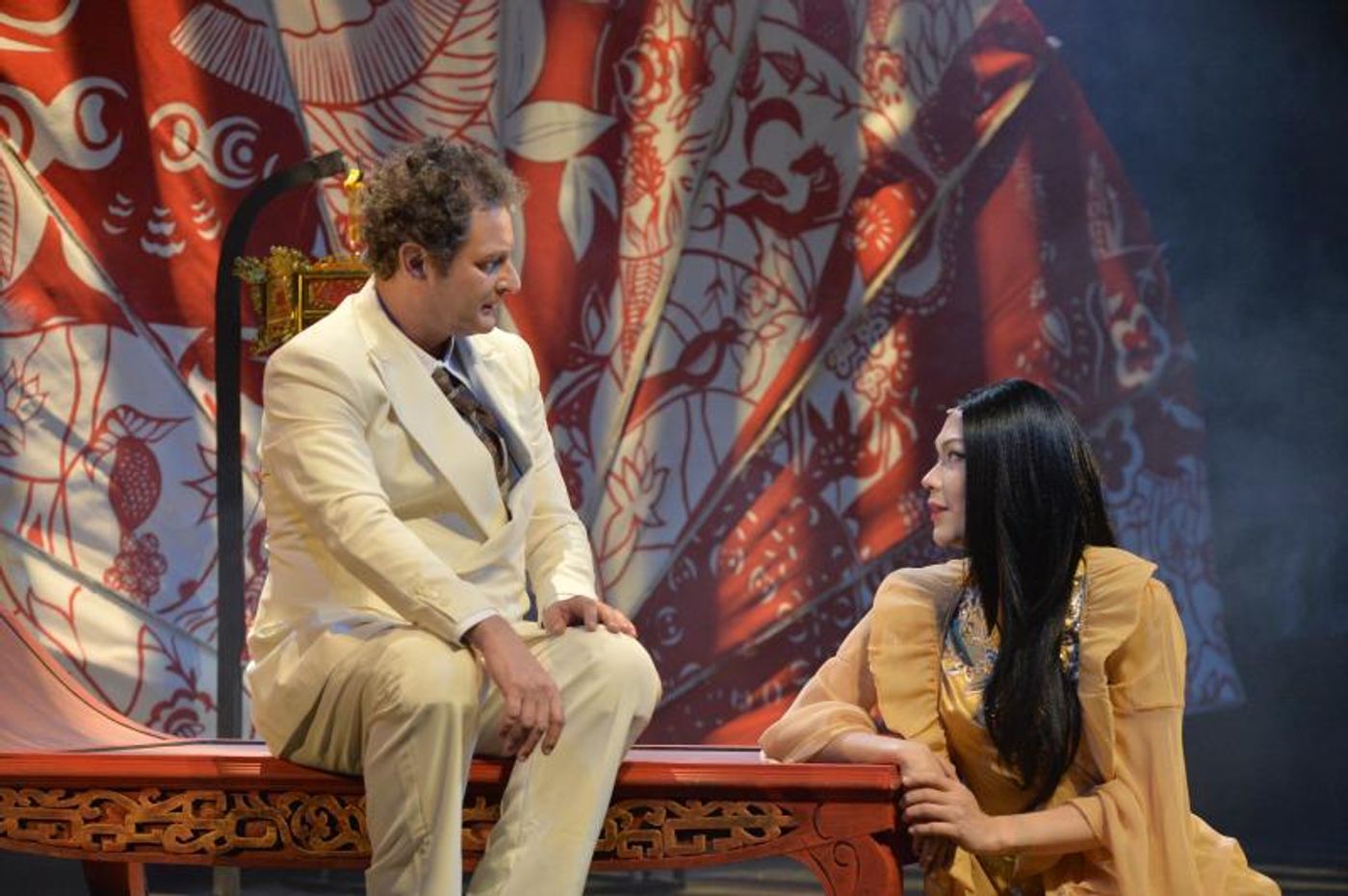 Manila, Philippines--The press preview of David Henry Hwang's award-winning play "M. Butterfly," produced by Broadway producer Jhett Tolentino and Frontrow Entertainment, at the Maybank Performing Arts Theater proved to be far stronger than the force of nature, fluttering nonchalantly despite looming news of a super typhoon. As if on cue, Typhoon Mangkhut was a no-show when the local press trooped to the Bonifacio Global City Arts Center to witness with excitement the return of this classic, 28 years after an 18-year-old RS Francisco won the hearts of critics and audiences alike in Dulaang UP's 1990 local premiere.
Manila, Philippines--The press preview of David Henry Hwang's award-winning play "M. Butterfly," produced by Broadway producer Jhett Tolentino and Frontrow Entertainment, at the Maybank Performing Arts Theater proved to be far stronger than the force of nature, fluttering nonchalantly despite looming news of a super typhoon. As if on cue, Typhoon Mangkhut was a no-show when the local press trooped to the Bonifacio Global City Arts Center to witness with excitement the return of this classic, 28 years after an 18-year-old RS Francisco won the hearts of critics and audiences alike in Dulaang UP's 1990 local premiere.
Prior to the preview, a star-studded photography exhibit aptly titled "Chrysalis," featuring the works of Raymund Isaac, Jun de Leon, Mandy Navasero, BJ Pascual, Patrick Uy, Wig Tysmans, and Manny Librodo, generated extra glitz and buzz. Among those who spearheaded the exhibit's ribbon-cutting were national artists BenCab (Visual Arts) and Ramon Santos (Music), who led a bevy of who's who from the local world of theater, music, and art.
Philippine Pride
On top of these celebrated names, the production marquee boasts that of New York-based producer and Philippine pride Jhett Tolentino, winner of a Grammy Award (The Color Purple, Best Musical Theater Album) and three Tony Awards (Vanya and Sonya and Spike, Best Play; A Raisin in the Sun, Best Revival of a Play; and A Gentleman's Guide to Love and Murder, Best Musical).
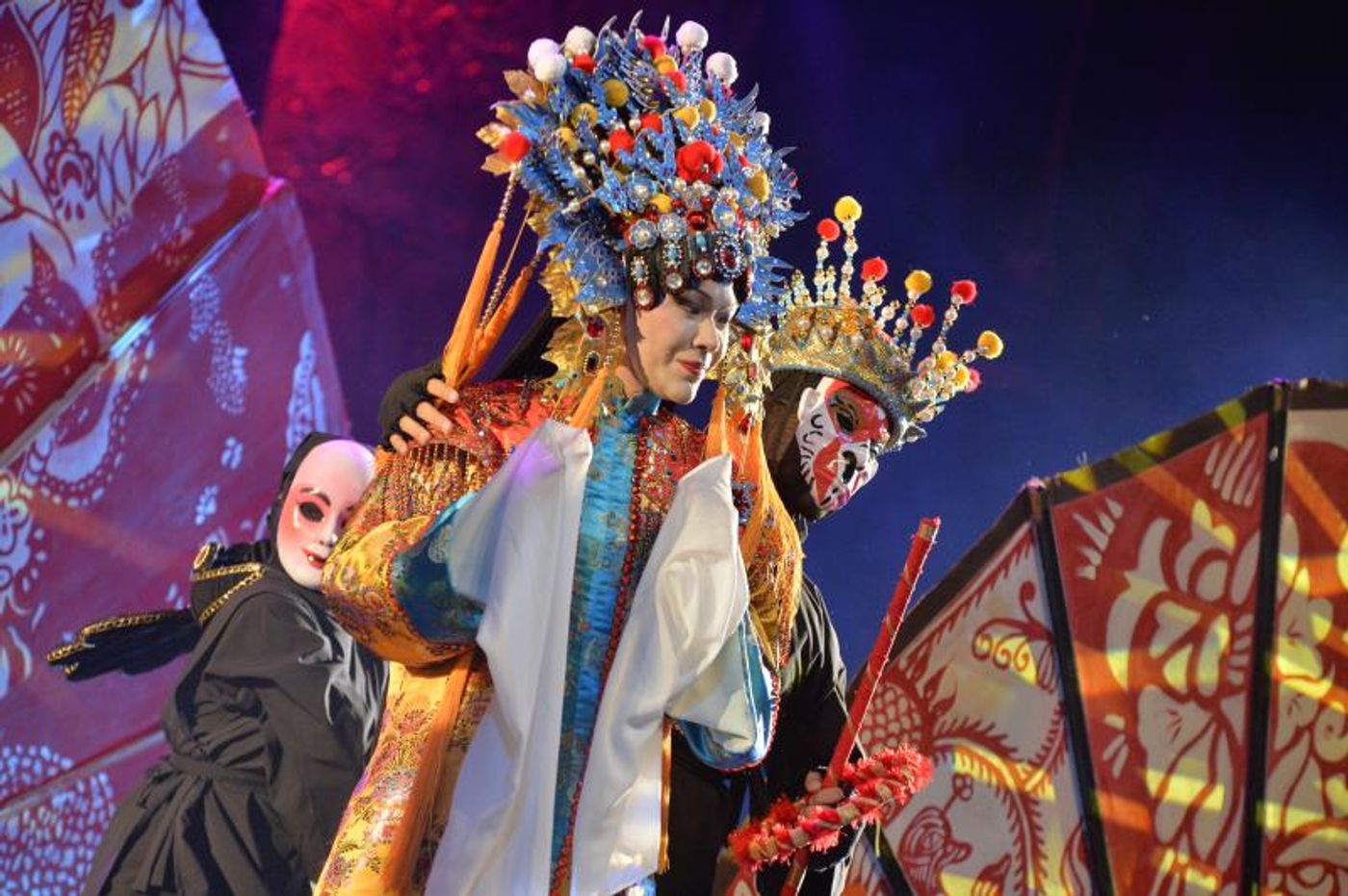 Tolentino has been recognized with an Ani ng Dangal Award by the Philippine Commission for Culture and the Arts (NCCA) given in 2016, and with a Ten Outstanding Young Men and Women of the Philippines (TOYM) by no less than President Rodrigo Duterte, for bringing international honor to the country. His first venture into movie production, Life Is What You Make It, won him Best Documentary in Thailand and Venezuela just recently.
Tolentino has been recognized with an Ani ng Dangal Award by the Philippine Commission for Culture and the Arts (NCCA) given in 2016, and with a Ten Outstanding Young Men and Women of the Philippines (TOYM) by no less than President Rodrigo Duterte, for bringing international honor to the country. His first venture into movie production, Life Is What You Make It, won him Best Documentary in Thailand and Venezuela just recently.
A genuine altruist, Tolentino and his team are donating all proceeds from the entire run to local institutions, in support of the arts and other humanitarian causes.
A Curious Backstory
"M. Butterfly" is David Henry Hwang's intertextual progeny of Giacomo Puccini's opera "Madama Butterfly." It exploits in satire the Puccini opera theme and plot from the vantage point of Rene Gallimard, a French diplomat who falls in love with a Chinese opera singer, Song Liling. Gallimard is later on jailed by the French government for treason, and in the course of his trial, Song's true gender and motive are revealed. Then there's the May 11, 1986 New York Times headliner on the curious case of French diplomat Bernard Bouriscot and his 20-year affair with Chinese opera singer Shi Pei Pu. An opportunity for Hwang beckoned.
Prior to writing the play, Hwang purposefully evaded researching on the factual characters of Bouriscot and Shi. He instead drew out from his own insights and experience to weave in missing details and parts to complete his play. Such creative twisting could be labeled today as "fake news," but Hwang's narrative bleeds of today's real economic, cultural, and psychosocial issues.
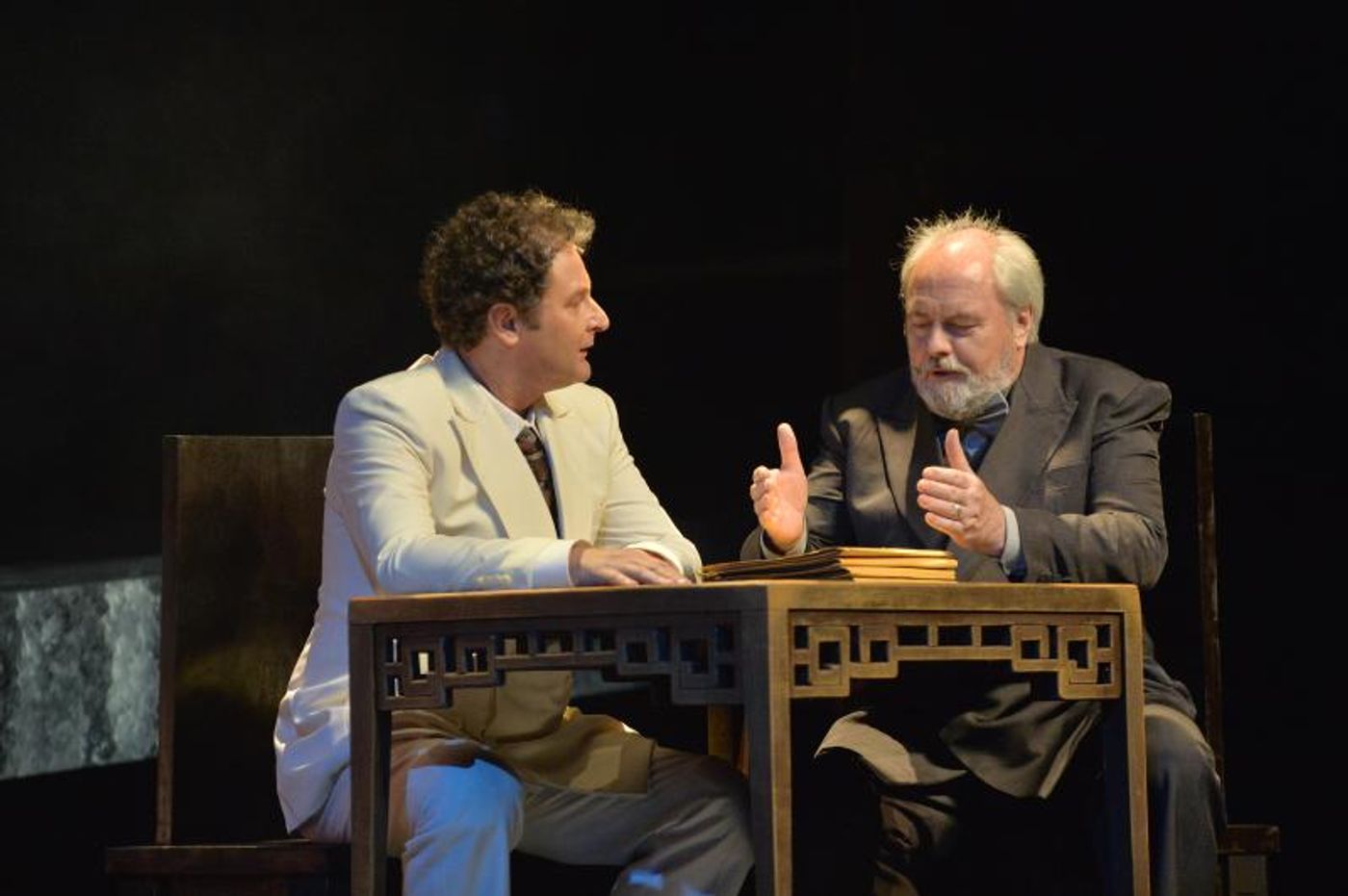 The play, which won the 1998 Tony Awards Best Play, then becomes Hwang's own personal commentary on gender and racial conflicts and biases. Here, he weaponizes Gallimard with a prophetic vision--a China rising to global superpower. Not even economic experts 30 years ago predicted China to develop into what it is now, given its overpopulation as a major hindrance. Hwang saw it otherwise. In the play, it is this vision, deemed by the US government as poor insight, that causes Gallimard's relief from his diplomatic post in China and his eventual downfall to ludicrous notoriety.
The play, which won the 1998 Tony Awards Best Play, then becomes Hwang's own personal commentary on gender and racial conflicts and biases. Here, he weaponizes Gallimard with a prophetic vision--a China rising to global superpower. Not even economic experts 30 years ago predicted China to develop into what it is now, given its overpopulation as a major hindrance. Hwang saw it otherwise. In the play, it is this vision, deemed by the US government as poor insight, that causes Gallimard's relief from his diplomatic post in China and his eventual downfall to ludicrous notoriety.
A Philippine pride by affinity, Chinese American Hwang proudly traces part of his ancestral roots in Cebu, Philippines.
The Company
Director Kanakan-Balintagos has successfully gathered a small company of theater veterans and newbies. Leading the cast are French actor Olivier Borten (Rene Gallimard), RS Francisco (Butterfly), Pinky Amador (Helga), and Mayen Estanero (Comrade Chin/Suzuki/Shu Fang), with a strong support from Norman McLeod (Manuel Toulon), Lee O'Brian (Marc), Maya Encila (Renee/Pin-Up Girl), and Rica Nepomuceno (Opera Singer).
Standing out among the support players is Mayen Estanero, who morphs into three different characters with solid credibility and consistency. She will be best remembered for her portrayal of Comrade Chin, a member of the Red Guards, to whom Butterfly passes information obtained from Gallimard. Her confrontation scenes with Butterfly on the role of Asian women provide some of the high-octane moments in the play.
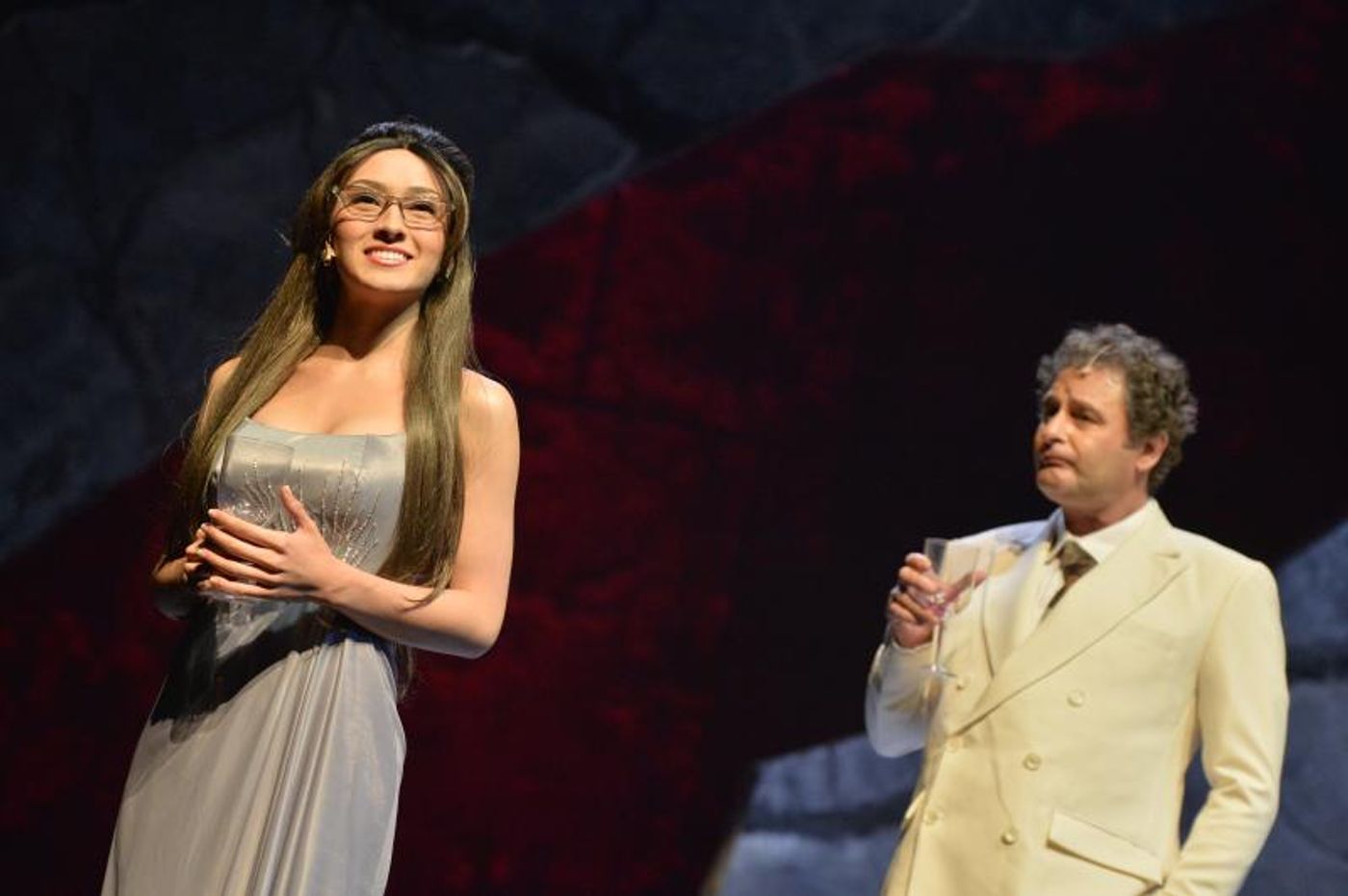 Another standout is Maya Encila, who plays the sensuous role of Renee in seminudity. Only 18 years old, Maya has been nominated twice for an Aliw Award as Best Actress in a Musical and has been acting in her family theater company since she was six. Her years of training is evident on stage--she delivers Renee with reckless, yet tasteful, abandon. Like Estanero, she shifts into another role (Pin-Up Girl) with conviction.
Another standout is Maya Encila, who plays the sensuous role of Renee in seminudity. Only 18 years old, Maya has been nominated twice for an Aliw Award as Best Actress in a Musical and has been acting in her family theater company since she was six. Her years of training is evident on stage--she delivers Renee with reckless, yet tasteful, abandon. Like Estanero, she shifts into another role (Pin-Up Girl) with conviction.
Being the veteran that she is, Pinky Amador as Helga provides a convincing stereotypical portrayal of an outspoken, stubborn Western woman. She successfully provides a stark contrast to the submissive and tender image of Butterfly's Eastern woman boxed in the confines of Eastern culture. Her portrayal, however, is hindered by the lack of rapport between her and Olivier Borten's Gallimard, who comes across incongruous in relation to Amador's role. Amador, nevertheless, is an amazing presence to behold.
Borten's portrayal of the French diplomat may actually polarize audience opinion. His Gallimard may not possess the charm and enigma of Jeremy Irons, who essayed the role in the film adaptation, but his take on the role is not without substantial merits. Borten dichotomizes the role into two acts, and while his portrayal in the first act borders on taradiddle, this device successfully masks his eventual metamorphosis in the second act. The downside to this is that his Gallimard in Act 1 fails to land comedic jabs and sink serious bites, which somehow diminishes the narrative genius of Hwang's material. The redeeming value of his performance lies in Act 2 where his transformation becomes clearly evident, and his character's denouement reaches an unexpected turn. Such personal choice of portrayal actually steers him clear of the shadow of Iron's greatness, making Gallimard all his own.
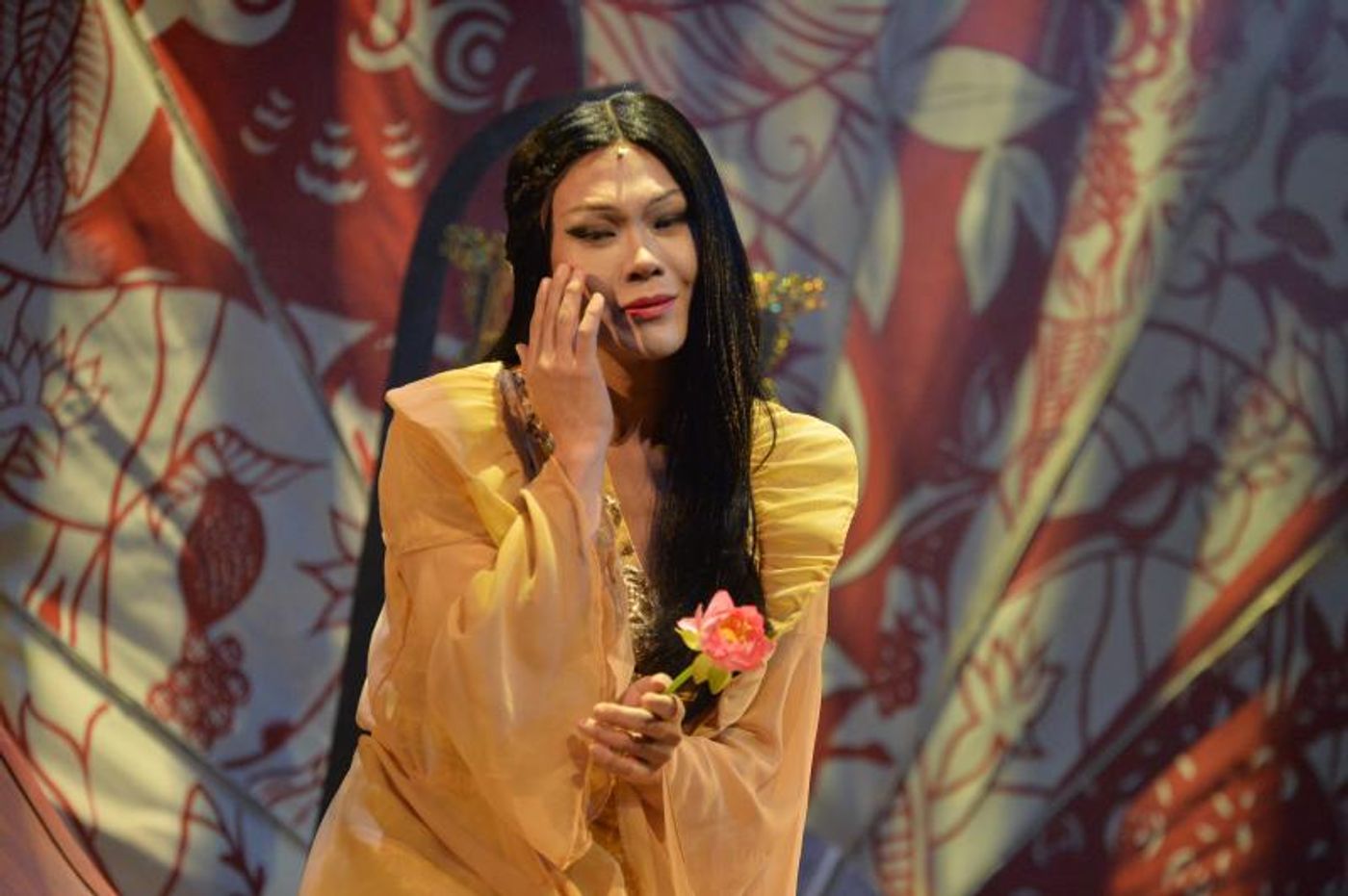 On the other hand, RS Francisco's Butterfly not only soars high; it scorches, too. The gender mystery of his character, which was instrumental in the success of the original Broadway staging (I am somehow convinced his RS came from his first Butterfly stint), may now be known to most theater-goers, but his "little butterfly" still possesses the enigma and appeal: the preview audience willingly submitted themselves to some luscious and fun long-legged ride.
On the other hand, RS Francisco's Butterfly not only soars high; it scorches, too. The gender mystery of his character, which was instrumental in the success of the original Broadway staging (I am somehow convinced his RS came from his first Butterfly stint), may now be known to most theater-goers, but his "little butterfly" still possesses the enigma and appeal: the preview audience willingly submitted themselves to some luscious and fun long-legged ride.
Francisco spits out frustration and longing in hushed and dainty anguish, with never a moment of overacting. His final scenes challenge you to bare the inner recesses of your darkest fantasies, and together with Borten, surreptitiously seals the doom of one's character in the end. Audience deception has never been this sweet.
Brave Creative Choices
Director Kanakan-Balintagos prides himself in "working with an actor's fire." His staging can be characterized as one brave choice, and like Borten, stays out of anyone's artistic shadow. His search for authenticity is best exemplified in this production, but overall, there are tiny but workable pitfalls, most notable are few individual performances coming off dissonant from the whole.
At first glance, Ohm David's set looks drab, but it provides the portentous atmosphere of prison in contrast to the colorful giant Chinese fans that serve as the major scene-to-scene transit. These clashing elements, in sync with the director's motives, work well with the actors' performances, which come across bigger and more pronounced.
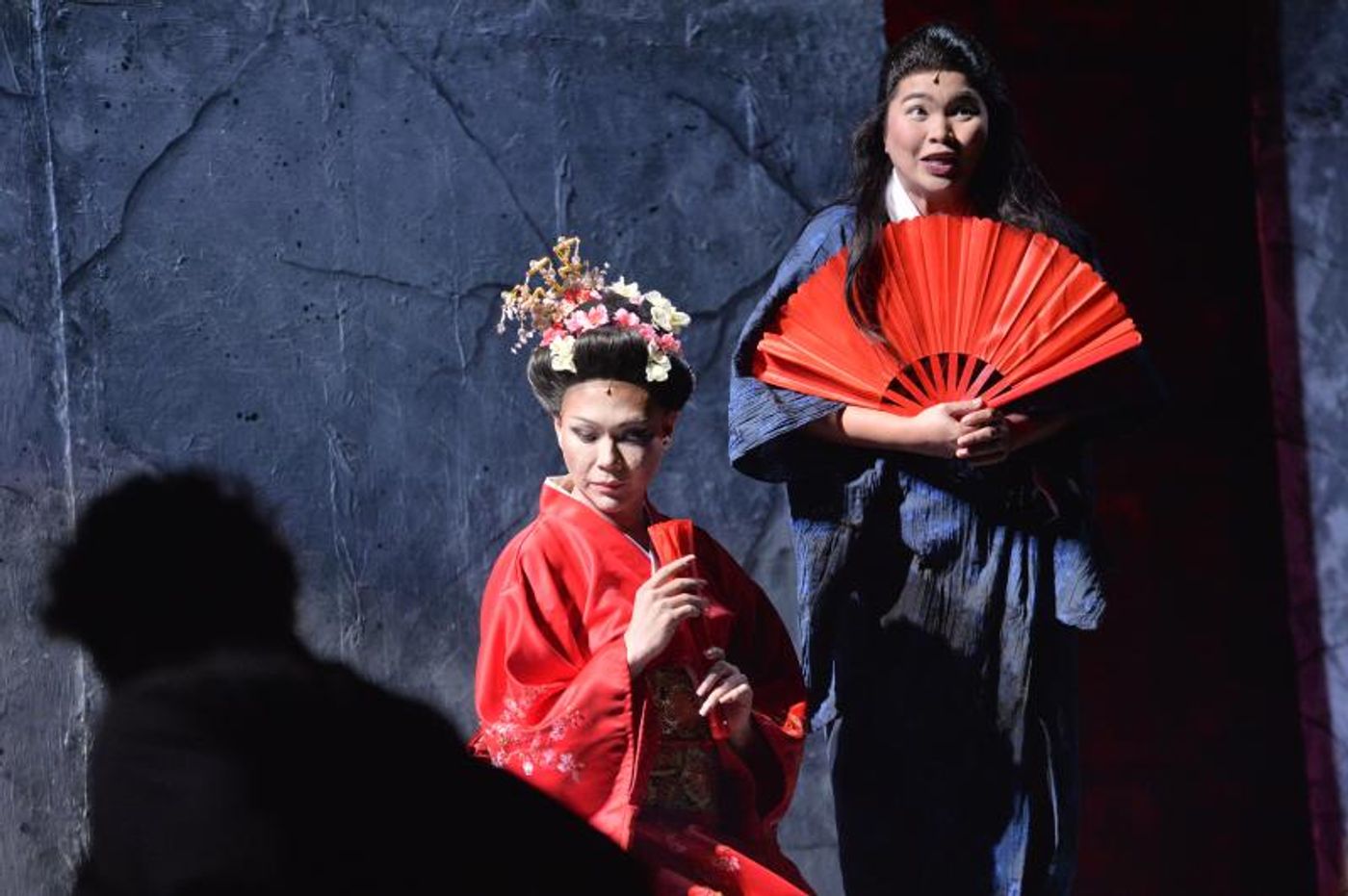 A Personal Note
A Personal Note
Research is rife with findings on how the mind cannot distinguish real from imaginary. In the course of this writing, I was intrigued by how Hwang and his two leading characters have immersed themselves in deception and fantasy, blurring the line between real and imagined, and if such mind's inner working actually holds water. Other studies also suggest that daydreaming may be creatively helpful, but overdoing it could be dangerous. Perhaps most notable of theories pertaining to our brain and the subconscious is the "Freudian Slip."
Freud suggests that nothing happens by accident, and our subconscious may hold the key to unlocking hidden or denied fantasies.
With the play, Hwang has presented to us a disturbing symbol of our deepest fear or fantasy in Bouriscot and Gallimard, either long hidden or denied. As the global movement for mental health awareness started to gain momentum in 2014 as part of Millennium Development Goals (MDG), is it safe then to assume that Hwang must have addressed in his own subtle way the very issue 30 years ago?
The Verdict
Three decades after, "M. Butterfly" still continues to beguile and shock.
"M. Butterfly" plays at the Maybank Performing Arts Theater (BGC Arts Center, 26th St. cor. 9th Ave., Bonifacio Global City) now through September 30, 2018. Buy tickets (P1,000 to P2,000) from TicketWorld.com.ph.
Photos: Jhett Tolentino, Frontrow Entertainment
Reader Reviews
Videos

